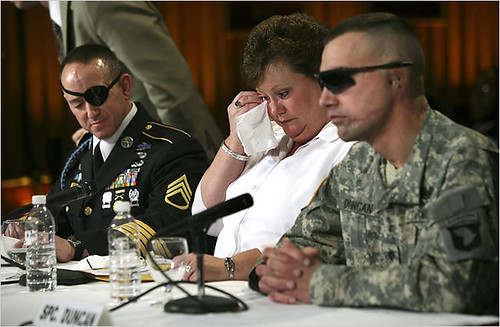
SSG John Daniel Shannon testified to the Oversight and Government Reform Committee about his experience as a patient at Walter Reed.
My wife constantly reminds me that I have benefits I’ve earned. Left to myself, I don’t really care most of the time. My professional ethics as a Sergeant are: “My soldiers will always come before myself”; “confirm, deny, and never lie”; “no excuses, mission first”; and “no one is more professional than I.” These ethics have dictated my growth, over the years, into a leader of personnel who truly believes in self-sacrifice. In fact, these very ethics guided my decision-making process on the day I was wounded, while making sure one of my men was not. Finally, these ethics lead me to seek help for a broken system in the only way I believe remains.
The command keeps talking to us about using the “open door policy.” The open door policy is a system implemented by military leadership at all levels that allows soldiers to raise their concerns about any given situation. If that soldier’s concerns are not satisfactorily met by a leader, that soldier can take those concerns to the next level of authority and continue this process until their concerns are addressed. I understand this policy and agree with its intention. However, during the time I’ve been here, I’ve seen the chain-of-concern passing our needs and concerns up the chain frequently. When changes are not made, the open door policy ultimately becomes a tool for leaders to squash problems and keep them in-house. Now, once this situation has been made public, the “powers that be” see fit to relieve some people of duty who are doing the best they can with what they’ve been given.
This is an obvious example of a broken system trying to survive when what it really needs is to be fixed. I lost the ability to trust the system and sought an open door that would bring public attention to the problems here. Things are now getting done. Some of the lower leaders at Walter Reed have paid a price—possibly with their very careers—as action is taken by higher levels of authority to show they are “fixing” the problem while, at the same time, trying to save themselves from accountability for their dereliction of duty. I believe that is an indicator of how the situation was handled in the past. And I quote, “There’s not a problem until the wrong people have a problem with it.” And, finally, sometimes the wrong people are made to pay the price for someone else’s mistakes.
Thank you again for allowing me to the opportunity to share my experience at Walter Reed with this Committee.
Shannon was released while still being disoriented. Shannon waited weeks with no one from the Veterans Administration contacting him about when he will continue his treatment.
The rooms at Walter Reed would put a crack house to shame.
Spec. Jeremy Duncan, who was wounded by a roadside bomb in Iraq, spoke about dilapidated conditions in the residential structure at Walter Reed, known as Building 18.
He testified that the walls of his room had holes in them and black mold growing on them.
“It wasn’t for anybody to live in a room like that,” Specialist Duncan said. “Most wounded soldiers, you know, you have just come out of recovery, you have weakened immune systems — the black mold can do damage to people.”
In short, he said, “I wouldn’t live there if I had to.”
This is just the beginning of the horror stories.
I have this in drafts --- Philip Gailey of the St. Pete Times. I was searching all over for a picture to include with the article as the one published in the Times was very, very evocative, as you probably know if you read the paper edition. It's him (SSG John Daniel Shannon) with his small (mini-twin) son looking at him from behind. Identical faces: one marred by our Thief-in-Chief forever. If I ever get it scanned I'll send it your way.
ReplyDeleteThis picture that you have here is perfect, as well. I don't know how you do it !!
Great piece !!
He sounds so much like every ethical military man I ever had the pleasure of knowing or being related to.